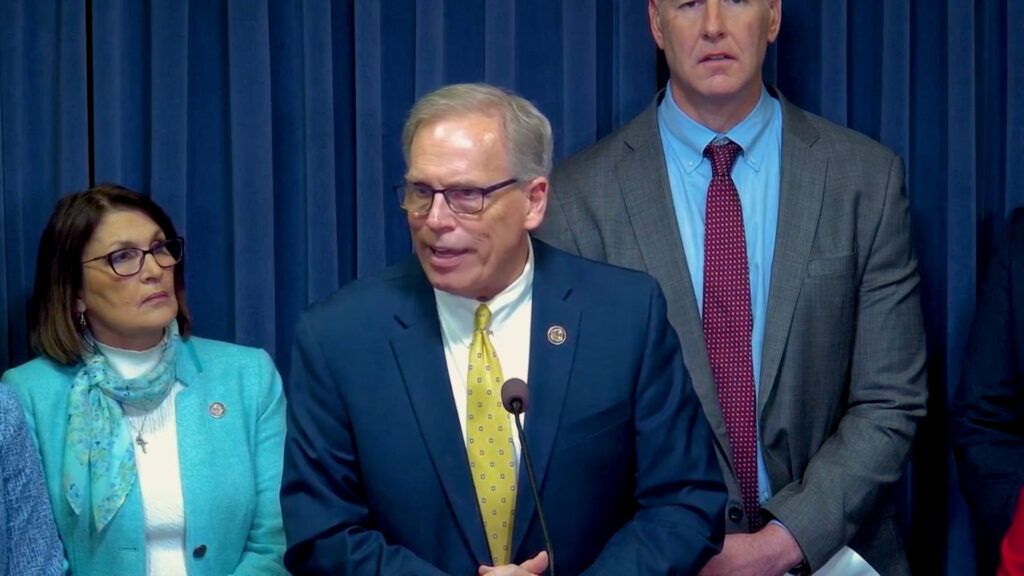Illinois Senate Republicans file legislation to find out

SPRINGFIELD – Members of the Senate Republican Caucus are once again asking for greater fiscal transparency about the Pritzker Administration’s migrant crisis, so lawmakers have a clearer idea about how much is really being spent on state programs for noncitizens.
State Senator Dave Syverson (R-Cherry Valley) joined Senate Republican Leader John Curran (R-Downers Grove) and State Senator Sally Turner (R-Beason) at a March 7 Capitol press conference to talk about legislation he is cosponsoring to require an annual report to the General Assembly identifying all state spending on services and resources for migrants.
“Sixteen days ago, Senate Republicans called on Governor Pritzker to release a budget that prioritizes the needs of Illinois citizens over a migrant crisis of his own making. One day later, he delivered a Budget Address that shockingly includes nearly a billion in new taxes, to be paid by Illinoisans. To add insult to injury, Pritzker’s proposed budget will spend nearly a billion dollars on programs for noncitizens he has encouraged to come to Illinois,” Syverson said. “It doesn’t take a rocket scientist to see the connection.”
The legislators argue that as the process of putting a state budget together begins in earnest, it’s critical to know how much is being spent on services for migrants and where the money is coming from.
“There is no doubt that Gov. Pritzker’s noncitizen welfare policies have exhausted state resources and helped create the largest migrant crisis in the Midwest,” Curran said. “Illinois taxpayers deserve to know how much of their money is being spent on noncitizen programs before they begin shelling out more than $1 billion in tax increases he proposed to fund this crisis he created.”
Over the last several years, Pritzker has issued numerous emergency declarations, using his executive power and transfer authority to divert funding from existing state programs with little-to-no scrutiny to cover costs associated with the migrant population. Despite repeated inquiries from the Senate Republican Caucus, the Governor’s Administration has failed to answer simple questions about the spending.
“Ultimately, because of the way he’s moving money around with zero transparency, we don’t really know what how much the Governor is spending on the migrant crisis,” Turner said. “If Pritzker is going to ask for $1 billion in new taxes, the people of this state deserve to know how they will be spent.”
Senate Bill 3170 would require the Illinois Department of Human Services to work with relevant State agencies, to prepare an annual report to the General Assembly identifying all state spending on services and resources for migrants. It would also be made available to the public on the department’s website.
The report would include details of services and resources provided by various state entities, including but not limited to the State Board of Education, Department of Human Services, Department of Public Health, Illinois Emergency Management Agency and Office of Homeland Security, Department of Central Management Services, Department of Labor, and Department of Healthcare and Family Services.
The report is required to include the following information concerning expenditures:
- Total amount spent on noncitizen and asylum-seeking populations in the previous fiscal year.
- Specific appropriations authorizing the spending.
- Any transfers among line-item appropriations associated with noncitizen and asylum-seeking populations.
- Total number of families or individuals impacted by each service or resource.
- Funding sources of the service or resource.
- Contracts awarded to organizations providing services or resources in various categories such as emergency shelter, food, health screenings, legal services, job readiness support, enrollment in public schools, long-term housing, mental health assessments, and other related spending.
Senate Bill 3170 also requires the Governor to include a detailed accounting of all proposed spending on noncitizen populations in future state budgets, providing an additional layer of transparency to the people of Illinois.

